If you’re around my age, you may remember the “Milk: It Does a Body Good” commercials that convinced most of American that consuming dairy was critical to our best health. Today, though, dairy-free alternatives line every supermarket shelf, and people are experimenting with removing dairy from their diet all together (I even guide participants in my 10-Day Reset to go dairy-free for 10 days). At the same time, Greek yogurt is touted as a healthy breakfast and keto enthusiasts put cheese on everything. It’s all a bit overwhelming, to be sure. So today, I’ll give you the run down of the benefits and drawbacks of including dairy in your diet, and help you answer the question: “Is dairy healthy?”
Benefits of consuming dairy
For a long time, drinking milk and consuming dairy was considered an important part of being healthy. Here are a few arguments in support of consuming dairy:
- The USDA still recommends consuming 3 cups per day of low-fat and fat-free dairy. While I don’t want to be a pessimist, you likely know that I place little credence in the government’s nutrition recommendations (over $6 million was spent by dairy lobbyists in 2017), the government has been incredibly slow in catching up to modern nutrition science, and Harvard refuted the MyPlate dairy recommendations in its Healthy Eating Plate.
- Traditional nutrition experts, like Sally Fallon (who wrote Nourishing Traditions) and The Weston A. Price Foundation advocate consuming raw, full-fat, unpasteurized dairy because of its rich nutrient, protein, and healthy fat content as well as its enzyme load and beneficial bacteria content. You can read more about that here.
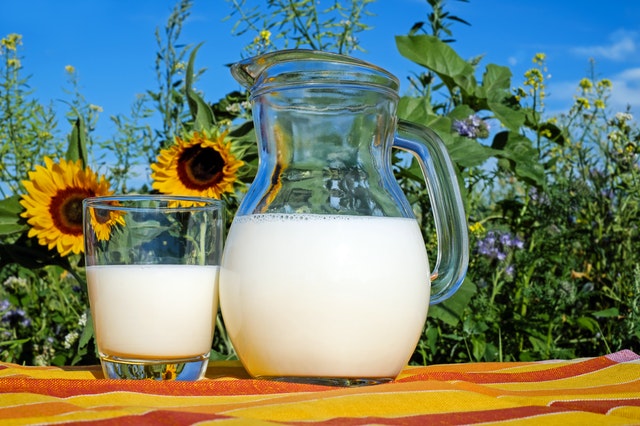
- The impact on heart disease risk is hotly debated. The USDA and “old school” health recommendations suggest that consuming full-fat dairy increases risk of heart disease, since it contains saturated fat. However, recent studies show benefit of consuming dairy. One showed that those who consumed more full-fat dairy had 69% lower risk of death from heart disease, and another showed reduce risk of heart disease and stroke for those who consumed grass-fed, full-fat dairy. A recent study confirmed the correlation between consuming more dairy and having a lower risk of cardiovascular disease and mortality.
Potential drawbacks of consuming dairy
- Conventional dairy contains bovine growth hormone (rBGH) and antibiotics used to keep the cows infection-free in very crowded conditions. Consumed once, this should be no problem, but over time, high intake can mess with our bodies’ own hormone levels, and can contribute to the growing problem of antibiotic resistance.
- Dairy is highly inflammatory for most people, and most of us are already dealing with chronic inflammation. This can lead to bloating, gas, constipation, diarrhea, acne, and several other potential issues, and is the main reason we eliminate dairy in my 10-Day Resets. Because the average American consumes dairy every single day, it’s really hard to isolate if it’s causing issues for us until we completely pull it out for a while to see if the issues return upon reintroduction.
- Dairy is also acid-forming in our bodies. Our bodies like to maintain a neutral pH balance (the actual level varies between specific tissues and parts of the body). Milk, when consumed, alters the pH slightly more to the acid side, which means your body has to compensate by leaching calcium, magnesium, or phosphorus from your bones. This means that high consumption of dairy may actually cause more risk of bone fractures (see the section below on calcium for more)!

- Low-fat and fat-free dairy (the kinds recommended most commonly) spike insulin much more than would be expected by their sugar content (read more about that here). I’m all about keeping blood sugar stable, so this raises caution.
- Cheese releases “feel good” hormones in the brain that often leave you craving more. Read more about that here.
- Humans are the only species that drink the milk of other animals. Cow’s milk is meant to grow baby calves into big cows. Many people consider this unnatural.
- Up to 75% of people have some form of lactose intolerance, meaning that their bodies stop producing the enzyme lactase, which helps break down lactose, a milk sugar. So even if you’re not running to the restroom right after consuming dairy, your body is likely having a tough time breaking it down, which can lead to mild bloating and / or an inability to absorb the nutrients you’re consuming.
What’s the bottom line?
Most of us are not consuming fresh dairy, straight from grass-fed cows raised without hormones or antibiotics. If you are, and you don’t have any negative symptoms like bloating or indigestion, I say go for it! If not, though, I believe most Americans are consuming more dairy than is healthy for their bodies.
If you are consuming dairy, try out these suggestions to see what works for your body:
- First, if you’re open to it, take out dairy all together for 2 weeks or more. Then, reintroduce and see how you feel. If you feel bloated or have any negative symptoms, it’s likely a sign that your body doesn’t love dairy.
- If you don’t have any negative symptoms, or if you’re going to consume it anyway, try to switch your purchases to organic dairy, which will not contain hormones or antibiotics.
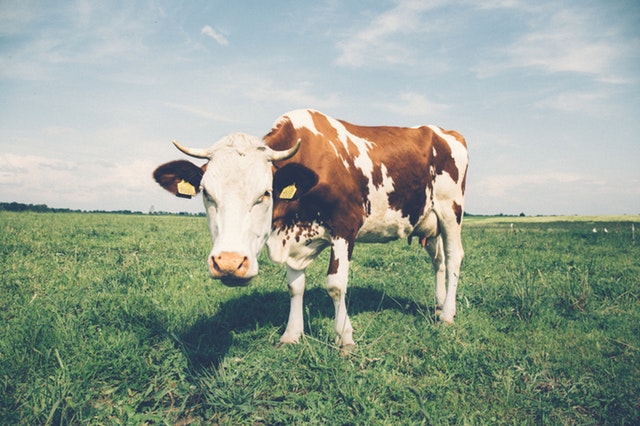
At the end of the day, consuming a little bit of dairy here and there is likely no big deal for most people, but consuming 3 or more servings per day, every day, is likely too much. For me personally, a little bit of dairy once or maybe twice per week is OK, but if I start overdoing it, I become bloated quite quickly. I know my body, and I do my best to stay within the limits of what makes it feel great.
How do you get calcium without dairy?
We’ve been taught that we need dairy to have enough calcium to keep our bones strong, but actual research casts doubt on that theory. Did you know that the biggest cross-cultural study on the topic showed that those countries whose inhabitants consumed more dairy actually had a higher risk of hip fractures? It is believed that this is due to the acid-forming nature of animal proteins like dairy, which cause the body to leech calcium from bones to balance pH levels.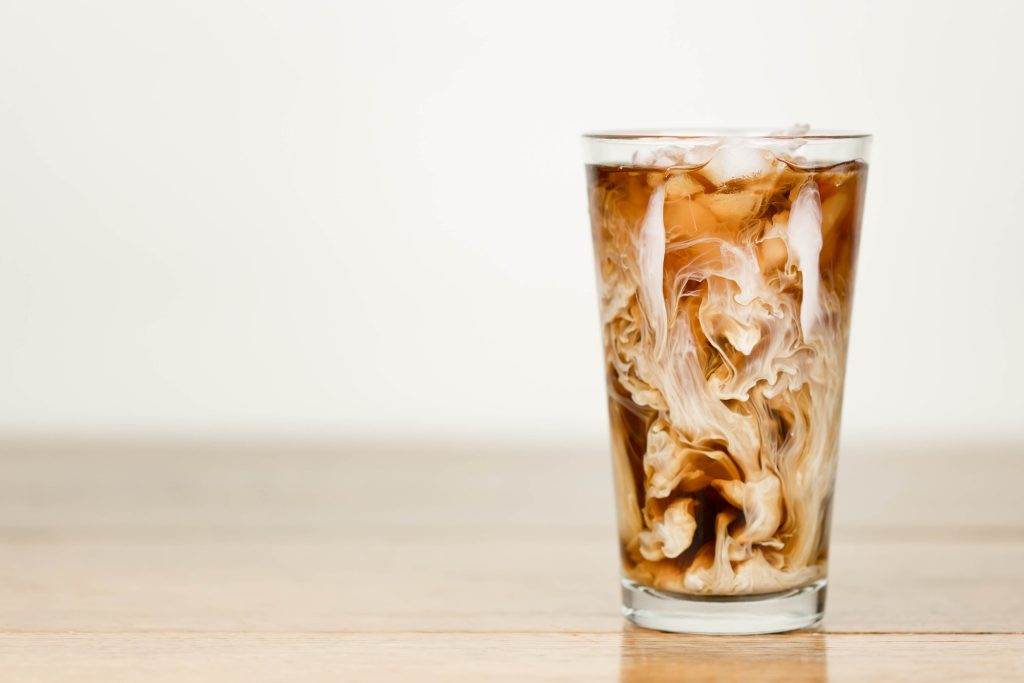
In fact, calcium from vegetables is even better absorbed by your body (an average absorption rate of 50% or higher, vs. 32% for milk). Green leafy vegetables like broccoli, Brussels sprouts, collard greens, mustard greens, turnip greens, kale, and chard are all fantastic sources of calcium, as are canned fish, tofu and other soy products, almonds, oranges, figs, sesame seeds, and more. See this table for more high-calcium foods, and suffice it to say that if you load up on vegetables, you can easily get enough calcium without turning to dairy.
What are the best dairy-free alternatives?
When finding dairy-free alternative products, I like to look for shorter, cleaner ingredient lists (to learn how to read labels, check out my webinar here). I prefer to avoid carrageenan, which has a host of negative side effects, and to stay away from added sugar (learn how to find it here) and artificial sweeteners.
Here are a few of my favorite dairy-free alternatives:
- Coffee creamer: Nutpods
- Dairy-free cheese flavoring (best if used on soups, stews, or other dishes containing liquid): Nutritional Yeast
- Dairy-free cheese spread: Kite Hill
- Dairy-free cheese shreds: Daiya, Mykonos, Violife
- Non-dairy milk: Malk milks
- Ice cream: So Delicious No Sugar Added or Halo Top Dairy Free
- Yogurt: So Delicious Unsweetened Coconut or Forager Cashewgurt (although, to be completely honest, I haven’t found any yogurt substitutes with the protein quantity, low sugar, and taste of “regular” yogurt!)
Now it’s your turn … Do you eat dairy? Have you ever eliminated dairy? If so, did you feel any different?

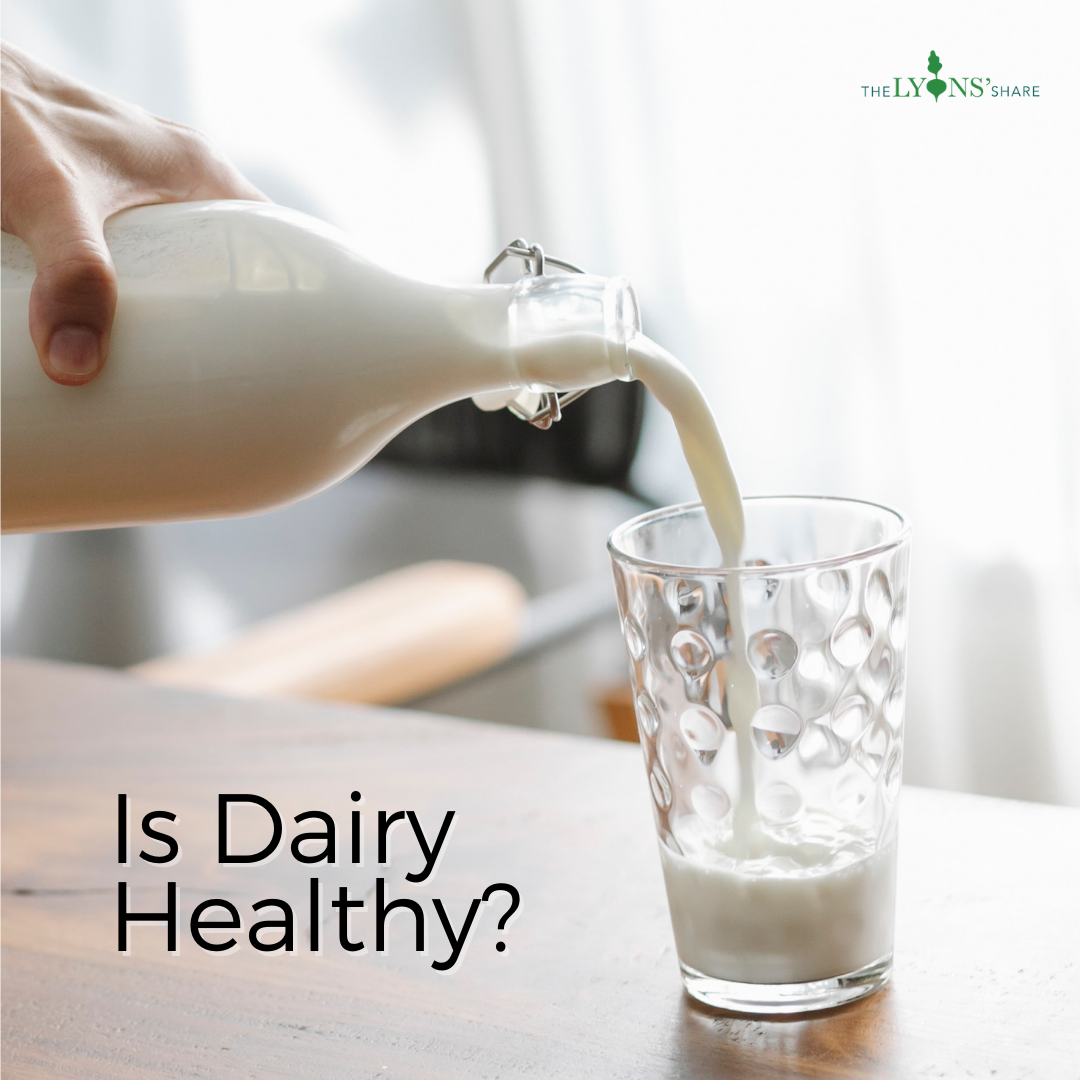
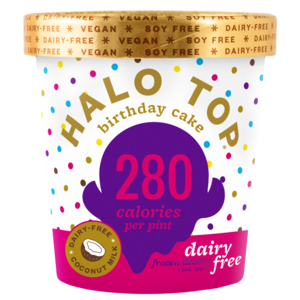
The yogurt I was frequently consuming and creamer in my coffee were the last items I figured I needed to clean up! Thanks so much for the helpful post and suggesting alternatives. Also, a friend in Dallas makes the most delicious vegan, gluten free, all natural queso dip. Her salsa, also very clean, was selling #1 on Amazon. She grows her organic vegetables on her ranch in Athens, TX. Would love your thoughts! Thanks again, Megan, for looking out for us!
https://eatzubi.com/products/zubis-sample-3-pack-salsa-crema-queso-8-oz-jars
YUM! Thanks for pointing this out, Vanessa! Just bought a sample pack … love supporting other small businesses!!! 🙂
Thanks, Megan! I love this article. Thank you for providing these recommendations. I’ve been pleasantly surprised with the Sprouts brand of their Sprouts Vanilla Coconut Milk No Sugar Added Non Dairy ice-cream. Only 1 gram of sugar. Let me know what you think of it!
https://shop.sprouts.com/search?search_term=nondairy%20icecream&tags=sprouts-brand
Vanessa, it looks similar to the So Delicious! Great find! 🙂
Oops! Got Vanessa and Veronica mixed up. I know you’re Veronica – sorry about that! 🙂
I love this Megan! Thank you for providing these recommendations! I’ve been pleasantly surprised with the Sprouts store brand of their “Sprouts Vanilla Coconut Milk No Sugar Added Non Dairy” ice-cream. Only 1 gram o sugar. Let me know what you think of this one.
https://shop.sprouts.com/search?search_term=nondairy%20icecream&tags=sprouts-brand
Thank you for this honest and evidence-based review, Megan!
I do consume dairy in moderate amounts, but I usually stick to fermented homemade products like yogurt and kefir. Those are great probiotic sources and are usually tolerated much better than plain milk. We get milk from our neighbor’s tiny farm instead of factory-raised dairy.
That’s what I would recommend to anyone who doesn’t want to give up dairy. The issues with factory farming are massive and they also include environmental pollution and terrible ethical consequences.
Best wishes and keep up the great work!
Great suggestions, Alex, thank you!
My pleasure!
This is so helpful! It’s very difficult to navigate the latest research because of the “behind the scenes” funding by those that promote dairy.
SO glad this was helpful, Bev!